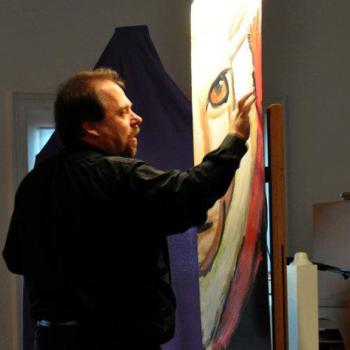Last year my bishop, Andy Doyle, made the news for his actions in regard to Episcopal same-sex blessings. He voted against the national Church's move toward same-sex blessings because he felt it represented the views of the majority of those in the Diocese of Texas—and at the same time, he commissioned a study of how individual parishes in Texas might move forward with blessings, since some parishes have a substantial population of GLBT Christians whose lifelong partnerships had never been celebrated, and whose lives had, in that respect, been pastorally neglected for years.
The Episcopal Church is one of many groups of Christians wrestling with the larger question of homosexuality; my friend Phyllis Tickle has argued that it is the last gasp of biblical literalism, and that after settling the questions of the Bible's complicity in slavery and the repression of women, Christianity will emerge on the far side with new ways of thinking and new forms of authority.
Ah, but in the meantime, Christianity is tearing itself apart over the question. As Justin Lee notes in his new book Torn: Rescuing the Gospel from the Gays-vs.-Christians Debate, young people who know and love gay people—or are themselves more comfortable in accepting their own gay identities—are finding themselves often forced to choose between a perception of the Church as peculiarly antagonistic to gays and their own sense of love and justice: "If [young people] view the church as an unsafe place for them, a place more focused on politics than on people, we just might be raising the most anti-Christian generation America has ever seen, a generation that believes they have to choose between being loving and being Christian" (10).
Justin tells his own story—an evangelical gay man who fought his nature by participating in "ex-gay" groups only to discover that they didn't cure gayness—and that most Christians didn't have any response beyond simple condemnation. It was, he says, like the episode of South Park in which Stan discovers his dog Sparky is gay, and commands him to sit, shake, don't be gay. "I started feeling a lot like Sparky. When many Christians found out I was gay, their only response was to shout uselessly, 'Don't be gay!'" (106)
Through prayer, close study of scripture, and faithful wrestling with his own nature, Justin comes to the conclusion of many progressives that the Church has had it wrong about homosexuality: "Because of Paul's teachings about grace and sin, and because of the way Jesus read and applied Scripture, I could no longer justify condemning a loving, committed, Christ-centered relationship based solely on gender. The bad fruit I saw coming out of my church's current approach and the good fruit I saw in Christ-centered gay couples I met only further reinforced this for me" (206).
Next month, my church will become the first Episcopal Church in Texas to bless a same-sex union. The couple is loving and faithful, to each other and to God; they have been together for over twenty years, and one partner is currently a leader on our vestry, the lay governing body of the church. Not everyone in the church is happy about this ceremony, but for them and for anyone at all open to the possibility that the Church might have gotten things wrong, I'd recommend Torn. It's the story of a faithful journey toward a more loving reading of scripture—and a more loving way of being toward all God's children.
12/2/2022 9:10:32 PM





